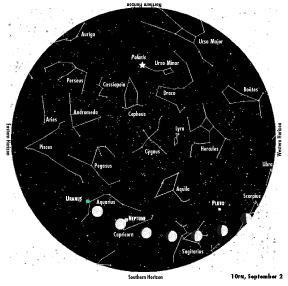 |
Sky Watch
by J. Alex Knoll
|
Pinching the Flow of Knowledge
The past 10 or 15 years have witnesses a revolution in astronomy. Long have amateurs aimed home-made telescopes at the heavens, but an increase in optics and a drop in cost have put quality scopes in backyards all over the country. Around the world, mountain peaks are dotted with gigantic telescopes trained to capture distant light, sound and energy.
Beyond terra firma, unmanned explorers to Venus, Mars, Jupiter and Saturn, have revealed in unmatched detail the structure of these other worlds. And the Hubble Space Telescope circles the globe, revealing distant planets in other solar systems and exploring the far edges of space and time.
All this has opened wide the eyes of humanity, expanding our knowledge, providing some answers about who we are and from where we come while at the same time leaving far more questions than ever.
But rather than expanding on such knowledge, the International Astronomy Union last week played Galileo Church when revoking Pluto’s status as a planet within our solar system.
At the heart of the argument are discoveries that the outer reaches of our solar system are filled with many Pluto-like objects, including one, dubbed 2003 UB313, almost twice the size of our ninth planet. Rather than plague us with the knowledge of additional planets, the IAU closed the door on any additions to our solar pantheon.
This weekend I assembled a solar system mobile for my son’s sixth birthday. As the pieces tumbled from the box, he burst, “Where’s Pluto? I love Pluto.” I kept my mouth shut, but rest assured that his mobile has nine planets orbiting the sun.
What the IAU missed is that Pluto symbolizes our boundaries of knowledge, and it inspires children of all ages to delve deep into the heart of darkness in the search for light and meaning.